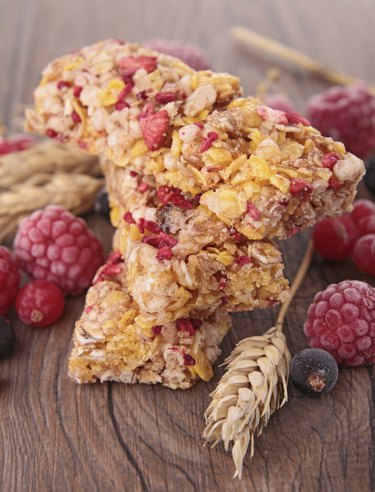
Protein is an essential macronutrient that supports several structures in your body. You can find protein in numerous sources including eggs, meat, fish and nuts. However, many people rely on protein supplements to get their recommended daily amount. The protein bar is just one option that has several dietary and lifestyle benefits.
Meal Replacement
Video of the Day
Many weight-loss plans -- especially those marketed as "high-protein" -- rely on meal-replacement bars to control portions and reduce calories. Meal-replacement bars typically contain high amounts of protein and fiber to help you feel fuller longer, along with many other essential vitamins and minerals to ensure well-balanced nutrition. The American Dietetic Association notes that meal replacements, including protein bars, are effective for weight loss when part of a well-rounded diet. However, you cannot rely entirely on meal replacements for your diet. Protein bars don't supply all the nutrients and antioxidants found in fresh fruits, vegetables and whole grains.
Video of the Day
Snack Between Meals
Eating snack-size protein bars can help reduce overeating between meals. Many bars come in indulgent dessert flavors -- like chocolate, peanut butter, fudge brownie and lemon meringue -- to satisfy your sweet tooth while avoiding blood sugar spikes and subsequent crashes. Over time, blood sugar spikes -- associated with snacks like candy bars and other sweets -- can lead to weight gain. Your body converts excess blood sugar, which is not immediately used for energy, into fat.
Workout Support
Supplying your body with necessary nutrients can help you get the most from your workout. A protein bar consumed before exercising supplies you with steady energy during your activity. It also offers benefits after your workout. The amino acids found in protein bars help provide the building blocks your body needs to generate new muscle tissue, repairing the microscopic muscle tears that occur over the course of your workout.
Convenience
Protein bars have the advantage of convenience. They are small and can be consumed quickly by active people or professionals. Meal replacement and snack varieties provide an easy option for dieters who lack the time or resources for extensive meal planning. Additionally, protein bars don't require measuring and mixing -- as with protein powders -- or refrigeration, as with manufactured protein shakes.
Considerations
The American Council on Exercise warn that you will not benefit from protein bars if you choose the wrong ones. Consuming high-calorie meal-replacement bars as a snack can lead to weight gain. Also, avoid protein bars with significantly high amounts of sugar, fat and sodium -- look for protein bars that contain less than 140 milligrams of sodium, and contain sources of added sugar, such as sucrose, honey, brown rice syrup or high fructose corn syrup. You need to limit your sugar intake to 25 grams daily for women and 37.5 grams for men, so make sure your protein bars aren't taking up a significant amount of your allowance.
- University of Illinois McKinley Health Center: Macronutrients -- The Importance of Carbohydrate, Protein and Fat
- Muscle and Strength: Protein Supplements Guide
- American Dietetic Association: Are Meal Replacements Effective for Weight Loss?
- American Council on Exercise: What You Buy Isn’t Always What You Get
- Colorado State University: Sodium and the Diet
- Harvard School of Public Health: Added Sugar in the Diet